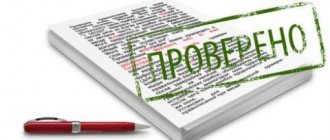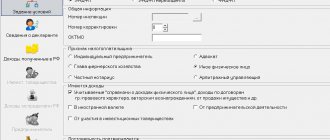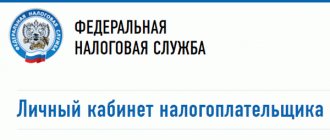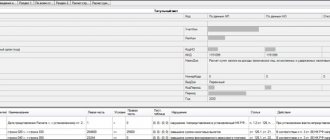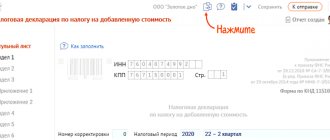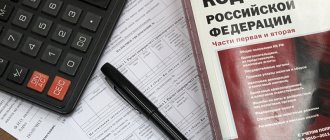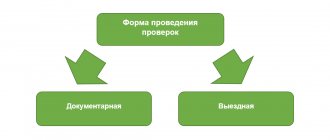All insurers transfer information about personalized records of their employees to the Pension Fund. They are needed in order to accurately record the insurance period and calculate pensions for persons in the compulsory pension insurance system. The main form for presenting this information is SZV-M. We will tell you what it is, how to fill out this form, to whom, where and when to submit it, and what information to include in it.
The essence of a desk audit of the Pension Fund of Russia
The essence of a desk audit by employees of the Pension Fund is that the submitted reports are analyzed for the correctness of their preparation, and also correlated with the amount of insurance premiums that were paid in this period. The desk audit is carried out on the basis of reports provided by the accountant to the Pension Fund, and is carried out directly at the place of work of the fund’s employees without traveling to the territory of the business entity.
A desk audit is carried out on submitted reports within three months, that is, until the reporting period for the next billing period. If errors are discovered, employees may require explanations for discrepancies or request any additional documents indicating the correct interpretation of a particular point.
An inspection of this kind is carried out by employees of the Pension Fund, who, in accordance with their official duties, have the right and must perform tasks of this kind assigned to them. At the same time, they do not require permission from management, since the implementation of this activity is their direct job responsibility.
Terms and periods of inspections of the Pension Fund and the Social Insurance Fund of the Russian Federation
Speaking about the timing of the desk tax audit, it should be noted that p. So, the Tax Code p. The day of submission directly depends on the method of submitting the tax return:. At the same time, tax authorities are not obliged to begin control measures strictly on the day they receive the declaration.
Therefore, the date in the cameral’s act may differ from the date of submission of the declaration. But the tax authorities are obliged to complete the audit on time. For details, see What deadlines for desk audits are extended due to non-working days. Study the material by getting trial access to the system for free. In what form can VAT payers receive requests for explanations, find out from the materials posted on our website:.
The desk audit is considered completed 3 months later, 2 months for VAT after its start on the day corresponding to the day the control activities began. For example, if the declaration was filed. If the end of the inspection falls on a day that is not in the third month of the inspection, then the inspection ends on the last day of that month. Can a decision on a desk audit be canceled if the deadlines for its conduct were violated?
The answer to this question was prepared by ConsultanPlus experts. Get trial access to the system and move on to the Ready-made solution. Find out what tax officials analyze during a desk audit of an updated declaration here. As noted above, the legislation establishes only the deadline for a desk tax audit. The possibility of extending or suspending such an inspection is not provided for by any legal act. This fact is indicated by a letter from the Ministry of Finance of the Russian Federation. Inspectors can extend the period of desk audit of this declaration by 1 month from 2 to 3 months.
This is possible if they find signs of violation of tax legislation. Thus, the tax authority has the right to carry out the necessary control measures only within 3 months from the date of submission of the tax return, Resolution of the Presidium of the Supreme Arbitration Court of the Russian Federation dated Contrary to this, some courts consider the results legitimate, even if the time frame for conducting desk audits exceeded 3 months, the resolution of the Federal Antimonopoly Service of the Ural District from the Drawing up and delivery of acts and decisions is possible only if violations are identified and only after the completion of a desk tax audit.
If, in addition to wages, an individual has another source of income, then he becomes obligated to pay tax and submit a declaration in Form 3-NDFL. The deadline for filing such a declaration is no later than April 30 of the year following the year in which income or other material benefit was received.
But, in addition to the obligation to pay tax, when applying any deductions - social, property, etc. In both cases, the period of the desk audit will be 3 months. It should be noted that when filing a return, you must submit an application for a deduction, as this is the basis for receiving it.
A deduction can be claimed in any year following the year in which the citizen incurred the corresponding expenses. But you can only return the tax paid over the last 3 years. This publication will introduce you to the nuances of conducting a desk audit of the 3-NDFL declaration. A desk audit of a tax return lasts 3 months, 2 months for a VAT return from the moment it is submitted by the taxpayer to the tax authority, 6 months.
If during the desk audit the taxpayer submitted an update, the desk audit of the primary declaration is terminated and a new desk audit of the already updated declaration begins, which also lasts 3 months.
Tax legislation does not provide for the possibility of extending or suspending such an audit. Subscribe to news. Subscribe OK. Join us on social media.
Desk audit - the timing for this form of tax control is determined by the legislation on taxes and fees. Let's take a closer look at the moment at which this check begins, how long it lasts, when it ends, and also tell you about other features of this form of control. What are the deadlines for a desk audit of a tax return? What are the deadlines for a desk audit for VAT? When should a desk audit be completed? Is it possible to increase the deadline for a desk audit? What is the deadline for a desk audit 3-NDFL Results.
What are the deadlines for a desk audit of a tax return? Speaking about the timing of a desk tax audit, it should be noted that p. The day of submission directly depends on the method of submitting the tax return: Personally to the tax authority. The day of submission is considered to be the day the reporting is submitted. In this case, the tax authority, according to paragraph. By mail. The day of submission is the date of dispatch. Although tax officials consider this to be incorrect, since the inspector cannot begin a desk audit without appropriate reporting.
This position is supported by court rulings, the decision of the Federal Antimonopoly Service of the North-Western District of the Russian Federation on telecommunication channels. The day of submission is considered the day of sending the item. When the desk audit must be completed The desk audit is considered completed 3 months later, 2 months for VAT after its start on the day corresponding to the day the control activities begin.
Is it possible to increase the period of a desk audit? As noted above, the legislation establishes only the deadline for a desk tax audit. What is the deadline for conducting a 3-NDFL desk audit? If, in addition to wages, an individual has another source of income, then he becomes obligated to pay tax and submit a declaration in the 3-NDFL form. Results A desk audit of a tax return lasts 3 months, 2 months for a VAT return from the moment it is submitted by the taxpayer to the tax authority, 6 months.
You can find more complete information on the topic in ConsultantPlus. Full and free access to the system for 2 days. Add to bookmarks. Previous article Next article. We recommend you read it. The latest from the forum. Your questions. Good afternoon I ask for your advice. A request has been received regarding the VAT return for the provision of documents in connection with the submission of a tax deduction line for the period from This amount was inflated in the city. Question - is it legal to demand clarification in the declaration, and then payment, explanations, SALT, etc.
Can I write about the expiration of all deadlines for the desk tax audit? Hello, please tell me from what date the month should be counted for transferring money for a tax deduction if the desk audit is completed. Your question. We help you with your work. Subscribe to the newsletter - once a week, free of charge.
Have questions? Get a quick answer on the forum.
The purpose and objectives of the desk audit of the Pension Fund of Russia
The purpose of the desk audit by the Pension Fund is to determine the correctness or violation on the part of organizations of maintaining personalized records for employees and to identify errors or inaccuracies that need to be corrected. In other words, a desk audit is needed in order to provide all working citizens with their pension rights, which depend on how personnel and salary records are maintained at the enterprise.
In accordance with this goal, certain tasks are identified that must be solved by a desk audit by the Pension Fund. These include:
- control over the correct application of the regulatory legislation of the Russian Federation in the field of pension rights of employees of organizations;
- identifying any violations regarding the calculation and payment of insurance premiums, as well as preventing their reoccurrence;
- collection of amounts owed on insurance transfers, if such is present in the activities of the business entity;
- application of penalties in cases of gross violation of Russian legislation;
- development of a schedule of desk inspections and identification of organizations that require on-site inspections.
Objects of analysis during a desk audit of the Pension Fund of Russia
When conducting a desk audit, the Pension Fund examines and analyzes certain documents submitted to business entities. First of all, these include:
| Document | A comment |
| RSV-1 (calculation of insurance premiums) | The document contains information in a generalized form for all employees of the enterprise (except for Section 6). This report reflects information on accrued wages; amounts for which pension insurance contributions are not calculated; direct amounts of insurance contributions. RSV-1 calculates both contributions to compulsory pension and compulsory health insurance for employees of the organization. In addition, the calculation contains data on whether the enterprise has employees for whom a reduced interest rate or an additional tariff for hazardous working conditions is used. RSV-1 is rented quarterly on an accrual basis |
| Personalized accounting (Section 6 of calculation of insurance premiums) | This section is part of the RSV-1 and is of greatest interest to employees of the Pension Fund, since it contains personalized information for each employee. At the same time, this section includes information such as accrued wages, non-contributory amounts, the amount of contributions to the Pension Fund, the period of work of the employee and its coding, as well as the use of an additional tariff when working in harmful or dangerous conditions. The report is submitted quarterly, like RSV-1 |
| SZV-M | The report appeared in 2021 and its purpose is to identify employees who receive a pension, but at the same time have official employment. This report indicates only the employee’s full name, his insurance certificate number in the Pension Fund and TIN |
When determining the base for calculating insurance premiums, special attention is paid to amounts that are not subject to contributions, that is, excluded from the calculation base. These include various types of social benefits, whether for temporary disability, illness or injury, in connection with maternity, as well as individual payments in the form of financial assistance to employees (see → Financial assistance to an employee: accounting, taxes, insurance contributions) .
In addition, Pension Fund employees also pay attention to the additional tariff that must be paid by the organization for those employees who work in hazardous conditions. To calculate it, workplace certification must be carried out, based on the results of which positions that correspond to harmful or dangerous production conditions are identified.
Deadlines for submitting the SZV-M report
By month
Starting from December 16th year, the deadline for submitting this report is set on the 15th day (no later than) of the month following the reporting month , namely:
- December '16 - January 16, '17.
- January 17th – February 15th.
- February – March 15th.
- March – April 17th.
- April – May 15th.
- May – June 15th.
- June – July 17th.
- August – September 15.
- September – October 16th.
- October – November 15th.
- November – December 15th.
Later reporting deadlines in December, March, June and September are due to the fact that the reporting dates of these months fall on weekends.
The latest information on reporting deadlines is given in this video:
First term
SZV-M is a very young type of reporting. It has been known since April last year, and its previous filing deadline was set for the 10th of the month. And the first report had to be submitted by May 10, 2016.
The process of conducting a desk audit of the Pension Fund of Russia
The direct process of conducting a desk audit by the Pension Fund begins only when the business entity has submitted the necessary reports for consideration. It should be noted that for organizations with more than 25 people, it must be transmitted via secure electronic communication channels through a special operator. It provides information that the document has been submitted to the Pension Fund, but is not yet considered submitted, or has been verified and accepted by the Pension Fund.
All documents submitted by the organization are subject to verification to ensure their compliance with the requirements of Russian regulatory legislation. If any errors or inaccuracies are identified, Pension Fund employees request explanations from the organization or additional documents. It should be noted that, if necessary, the Pension Fund may request information from the Social Insurance Fund, since in some cases the calculation of contributions to both of these funds is the same. For example, in both cases, contributions are not calculated on amounts for temporary disability certificates, benefits for the birth of a child or up to 1.5 years.
Errors or omissions identified during the RSV-1 check must be corrected within five days, and an updated RSV-1 with corrected indicators must be sent. In the event that a business entity does not agree with the corrections, it needs to write an official letter in which it indicates why it entered certain data in the calculation. It is also necessary to attach copies of supporting documents to the letter, if available. Letters with supporting documentation are also sent via secure electronic communication channels using a simple, formalized letter.
Example of a completed report
IMPORTANT!
If the organization has only one employee (manager), the report still needs to be submitted. Exception: the founder of a legal entity with whom an employment or civil contract has not been concluded and to whom no payments were made during the reporting period.
The law does not prohibit submitting reports ahead of schedule, for example, for August 2021, sending them on August 25, 2018. The report will be accepted, but you may have to send an adjustment if a new employee is hired from August 25 to August 31. In this case, you need to send an additional form, which will reflect the data of only the accepted employee.
If an “extra” employee is indicated, for example, who was fired last month, complete the cancellation report, where you indicate only the “extra” employee.
Documents drawn up during a desk audit of the Pension Fund of Russia
Upon completion of the desk audit, Pension Fund employees draw up a report within 10 days that reflects all errors or inaccuracies that must be corrected. It must be sent to the audited legal entity within 5 days, and a response to it must be sent within 15 days. The employer always has the right to agree or disagree with the results of the audit, as well as try to independently understand the difficult situation or seek help from the judicial authorities.
If a response is not received from the legal entity, the Pension Fund makes a Decision to hold the contribution payer accountable, which comes into force 10 days after it is drawn up and signed. Such a decision can be appealed in court within 3 months from the date of its receipt.
Judicial practice on violation of terms
Although this type of reporting is relatively new, extensive judicial practice has already developed on it, which will be interesting for employers who have problems passing the SZV-M.
- When compiling the SZV-M report, the responsible persons] made a mistake[/anchor]. They did not change the period and in the report for April, March was indicated. And although the report was submitted on time, PF employees counted it as a repeat report for March, and assessed a fine for failure to submit the April report on time in the amount of 9,000 rubles (the company employs 18 people). The court, to which the company's management appealed, considered it possible to apply subparagraph 4 of paragraph 1 of Article 111 of the Tax Code, recognized these circumstances as excluding the employer's guilt and canceled the fine.
- In the summer of 2016, the company delayed submitting reports and sent SVZ-M for May to the Pension Fund only on June 28th. The fact of this violation was established and a fine of 103,000 rubles was imposed. After which there was an appeal to the arbitration court. In the first instance, this punishment was upheld, but the court of appeal found the circumstances of the case mitigating the guilt, and reduced the fine by 10 times, to 10,300 rubles. The PF's cassation appeal against this decision was not satisfied.
Monthly reporting in the SZV-M form and the deadlines for its submission are discussed in this video:
Penalties for detecting errors
If gross errors were discovered during a desk audit, the Pension Fund has the right to hold the contribution payer accountable, including issuing a fine for illegal actions. This type of liability may include:
| Description of the violation | Fine |
| Failure to submit RSV-1 on time | Depends on the amount of insurance premiums to be paid – if there is a delay of up to six months – 5% of the amount of contributions for each month (no more than 30% and no less than 100 rubles) – if the delay is more than six months – 30% of the amount of contributions and 10% for each month (at least 1000 rubles, the final limit of the fine has not been established) |
| Failure to submit RSV-1 at all | The fine is calculated only after the on-site inspection and will be the sum of fines for all periods |
| Full or partial non-payment of insurance premiums | – 20% of unintentionally unpaid insurance premiums – 40% of the intentionally unpaid insurance premiums In addition, liability also includes the accrual of penalties for late payments. |
| Refusal to submit required documents upon request | 50 rub. for any document not submitted |
Desk inspection after closure of LLC
In the event that an organization closes, it is obliged to pay all necessary insurance contributions to the Pension Fund and fully report to government authorities. Even if the enterprise is already closed, the Pension Fund has the right to conduct a desk audit of the submitted reports and the correctness of the calculation of contributions and payment of payments. For this reason, it is necessary to store all documentation for the period established by law, for an individual entrepreneur - 4 years, for an organization - 5 years.
During a desk audit, Pension Fund employees carry out the following actions:
- check the reports for correctness;
- analyze the legality of applying a reduced tariff;
- monitor the correctness of calculation of pension contributions;
- monitor the timeliness of payment of insurance premiums.
